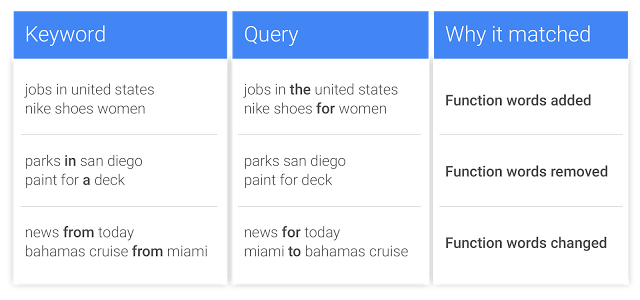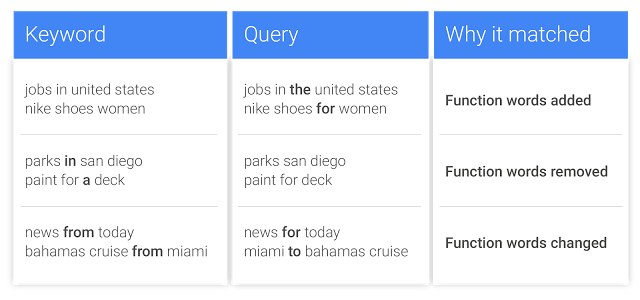Author: Robert Brady / Source: Practical eCommerce You may have missed the blog post from AdWords on March 17 about the expansion of close
You may have missed the blog post from AdWords on March 17 about the expansion of close variants. The second paragraph of that post reads, in part:
… over the coming months we’re expanding close variant matching to include additional rewording and reordering for exact match keywords.
I was surprised that AdWords used the phrase “close variants” to describe exact match. Sure enough, AdWords indeed intends to change the way that exact match behaves. It will do that in two ways: function words and reordering.
Function Words
Function words include, as examples: in, to, a, the, for, and but. They can be prepositions, articles, or conjunctions.
The change allows AdWords to (a) ignore function words in a query, (b) ignore function words in an exact match keyword, or (c) match what it deems similar intent function words.

Source: Inside AdWords.
AdWords calls this “rewording” and states that “this should only happen when it won’t change the meaning of your keyword.”
Reordering
The second way that AdWords can apply close variant matching is through reordering. Thus, someone searching for “size 13 men’s loafers” could see an ad from the keyword phrase “men’s loafers size 13” since it’s the same words, but a different order. Again, this should only happen when intent isn’t changed by having the words in a different order.
Exact Is Not Exact
Initially this seemed like a terrible idea. It reeked of a money grab by AdWords.
In fact, there is a good chance this will increase revenue for AdWords because roughly 15 percent of search queries on Google are unique — they haven’t been used in the previous six months. With unique queries, it’s unlikely that an advertiser would have added those keywords to its account, since the queries would not have shown up in search query reports and keyword tools. Now Google has more latitude to match keywords, even exact match, to these types of searches.
When AdWords launched close variants, it applied to broad match keywords and allowed AdWords to match singular-plural variations as well as misspellings. There were a few issues where plurals had different meanings, but all in all…

COMMENTS